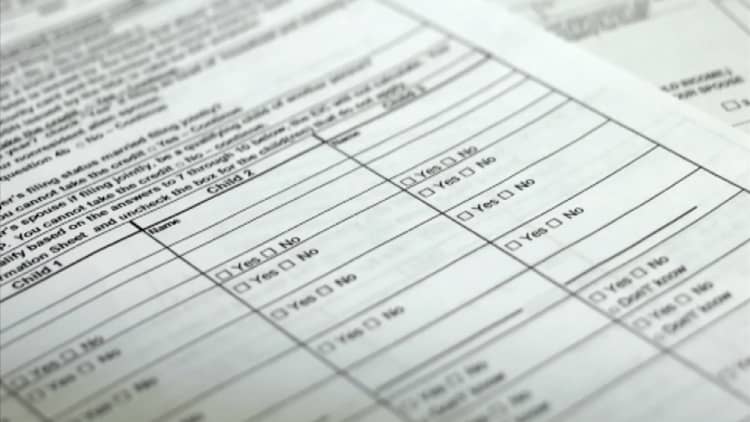Tax season is underway and many Americans are still unclear as to how the Tax Cuts and Jobs Act, which passed in December 2017, could affect them now.
But while the nuances of the new law can be confusing, Americans harbor other more common misconceptions about taxes as well. Don't be misled by these three myths that, according to the IRS, tend to trip up filers.
Myth 1: Refunds will be delayed
A lot of people seem to think that, thanks to the recent government shutdown, the third-longest in U.S. history, and ripple effects from tax reform, refunds could be delayed. In a recent report, however, the IRS says that it has worked to promptly resume normal operations. Despite the shutdown, it notes, the IRS "was able to open this year's tax-filing season one day earlier than the 2018 tax-filing season."
And the agency "will be doing everything it can to have a smooth filing season," according to IRS Commissioner Chuck Rettig.
It's true that returns aren't being processed at quite the same rate as last year. During this time in 2018, 51 million refunds were received by the IRS and 49 million were processed. That's a difference of 1.8 million. This year, by comparison, 49 million refunds were received and 47 million have been processed, for a difference of 2.2 million.
Nonetheless, in its report last month, the IRS said that more than nine of 10 refunds are issued in less than 21 days. In certain situations, though, it can take a bit longer: By law, the IRS could not issue returns "before Feb. 15 for tax returns that claim the Earned Income Tax Credit or the Additional Child Tax Credit." And "this applies to the entire refund, even the portion not associated with the EITC and ACTC."
So, if you filed in January and claimed one of these credits, the earliest you could have seen a refund was February 27, assuming you chose direct deposit and there were no additional issues with your return.

Other returns could "require additional review and a refund could take longer," the agency says. It's "important to take into consideration the time it takes for a financial institution to post the refund to an account or for it to be delivered by mail."
Still, taxpayers "should file when they're ready, the IRS says. "There is no need to wait." In fact, experts say the No. 1 move you can make this tax season is to file as soon as possible.
Most filers who qualify for one will see a quick refund, especially if they file online and opt for direct deposit: E-filing is the "fastest and safest way" to get your money, according to the IRS.
Myth 2: Tax transcripts will tell you your refund date and amount
Another common misconception, according the IRS, is that requesting a tax transcript — which contains relevant information from previous returns and may be needed to apply for a mortgage or loan — "will help a taxpayer determine the status of their refund." It won't.
"The information included on a transcript does not necessarily reflect the amount or timing of a refund," the agency says. Instead, it suggests using its online tools to inquire about your refund or return.
The website "provides many self-service tools for individuals, businesses and tax professionals," the IRS notes. For example, "taxpayers can view their tax account, get answers to common questions such as eligibility for a tax benefit or find free tax preparation help."
Myth 3: You should call the IRS and the agency may call you
A call to the IRS likely won't help you find out new information about your refund, as most of the relevant data can be found online. Trying to call may even end up frustrating you, since "demand on phones during early weeks of tax season is traditionally heavy," the IRS says. Instead, "taxpayers are encouraged to use IRS.gov to find answers."
If you do call, keep in mind that "telephone assistors can only research a refund's status if it has been 21 days or more since the taxpayer filed electronically, six weeks since they mailed a paper return" or if the website directs a filer to call. You will also need to verify your identity with your social security number, individual taxpayer identification number and other relevant information.

On the other hand, if you receive a call, text or email from someone claiming to be from the IRS, it's probably a scam. "The IRS doesn't initiate contact with taxpayers by email, text messages or social media channels to request personal or financial information," the agency notes.
An official would "never call to demand immediate payment using a specific payment method, such as a prepaid debit card, gift card or wire transfer. Generally, the IRS will first mail a bill if taxes are owed."
The IRS also won't threaten to bring in law enforcement to arrest you for not paying taxes, demand taxes be paid without giving you an opportunity to question or appeal the amount owed, or ask for credit or debit card numbers over the phone, it says in a 2018 report.
This year's filing deadline is Monday, April 15. That's also the deadline to file for an extension. Again, experts suggest filing early, because some taxpayers could see lower refunds this year and about 30 million could actually owe money to the IRS.
This is an updated version of a previously published story.
Like this story? Subscribe to CNBC Make It on YouTube!
Don't miss: 77% of Americans failed this short quiz on tax law changes—here are the 4 questions that stumped them




